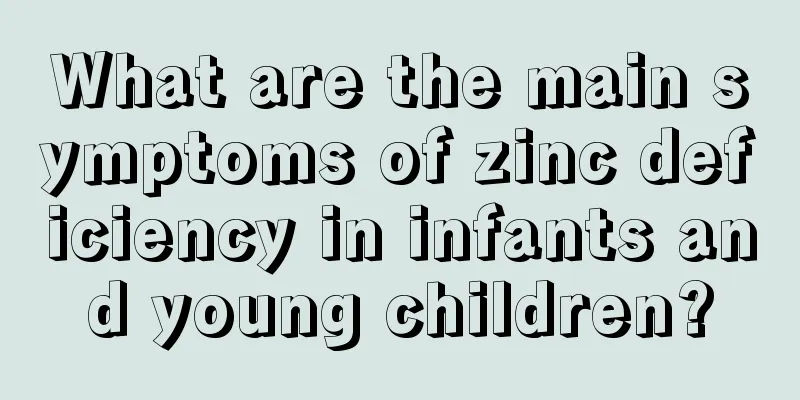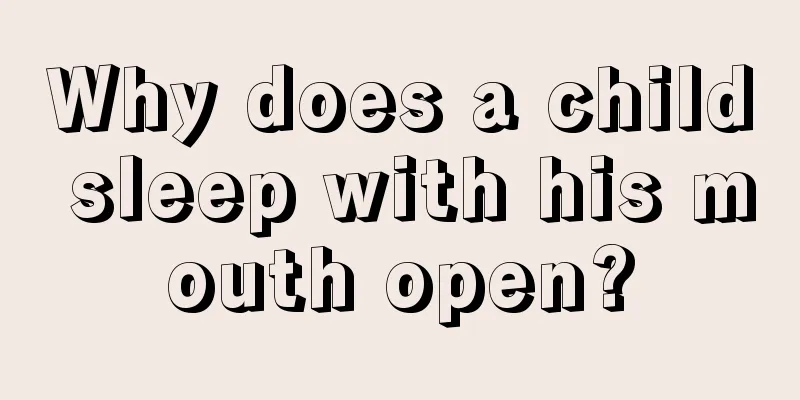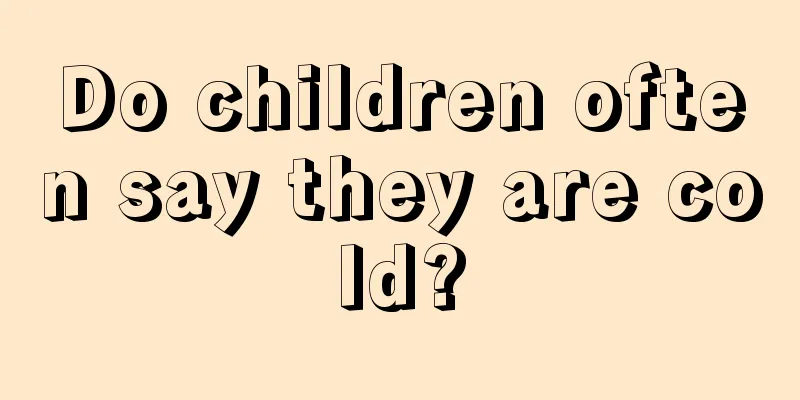What are the main symptoms of zinc deficiency in infants and young children?

|
Zinc deficiency in children is a topic that can never be fully discussed. Zinc deficiency in babies is very harmful to the body, so parents are so concerned. One-third of the babies who go to the hospital for trace elements every month will have zinc deficiency. The biggest symptom of zinc deficiency is poor appetite. There are too many babies who don’t like to eat in society now. Many parents have not paid attention to it. So what are the main symptoms of zinc deficiency in babies? The clinical manifestations of zinc deficiency are the result of reduced biological activity of one or more zinc species. 1. Slow growth The early typical manifestation of zinc deficiency in childhood is slow physiological growth rate. Zinc deficiency hinders the synthesis of nucleic acids and proteins and the activity of catabolic enzymes, leading to retardation of growth and development in children. The height and weight of zinc-deficient children are often lower than normal children of the same age. In severe cases, dwarfism may occur. 2. Decreased appetite Zinc deficiency often causes hyperplasia and incomplete keratinization of the oral mucosa. The epithelial cells that are easily shed and shed in large quantities can cover and block the taste bud holes in the tongue papillae, making it difficult for food to contact the taste buds and stimulate taste and appetite. In addition, zinc deficiency affects the synthesis of proteins and nucleic acids, and the metabolism of enzymes, reducing the activity of zinc-containing enzymes. It also has a certain impact on the structure and function of taste buds, further causing a decrease in appetite. 3. Pica: Children with zinc deficiency are often found to eat soil, paper, wall paint and other foreign objects. The symptoms will improve after zinc supplementation. 4. Decreased immune function Zinc can enhance humoral and cellular immune function, strengthen the phagocytic ability and tropism of phagocytes, change the blood perfusion and energy metabolism of diseased tissues, improve local and overall functional status, enhance physical fitness and resistance to reduce infection. When the total amount of zinc in the body decreases, the body's immune function decreases, and the mesenteric lymph nodes, spleen and other immune-related organs are reduced by 20% to 40%, causing a decrease in cells with immune function, impaired T-cell function, and a decrease in cellular immune ability, thereby reducing the body's defense capabilities. Children who are zinc deficient are susceptible to various infectious diseases such as diarrhea, pneumonia, etc. Experiments have shown that zinc deficiency impairs children's immune function, and various immune indicators have improved after zinc supplementation. 5. Slow wound healing. There is data showing that zinc treatment helps wound healing and promotes epithelial repair after burns. When zinc is deficient, the synthesis of DNA and RNA decreases, the collagen in the granular tissue at the wound decreases, and the granulation tissue is easily destroyed, making the healing of wounds, fistulas, ulcers, burns, etc. difficult. 6. Skin lesions Skin lesions manifest as enteropathic acrodermatitis, and severe manifestations include various rashes, bullous dermatitis, and recurrent oral ulcers. The characteristics of skin lesions are mostly erosive and symmetrical, often presenting as acute dermatitis, and may also manifest as hyperkeratosis. Some children have irregular and scattered hair loss, and their hair is red or light-colored. After zinc treatment, the hair color becomes darker. 7. Eye diseases: The eye is the organ with the highest zinc content, and the choroid and retina are the tissues with the highest zinc content in the eye. Therefore, the eye is very sensitive to zinc deficiency. Zinc deficiency can cause night blindness, and in severe cases, it can cause keratitis. In addition, zinc plays a role in axoplasm transport and is essential for maintaining the function of the optic disc and nerves. Zinc deficiency reduces axon function, causing optic nerve disease and optic atrophy. 8. Hypoplastic sexual organs: zinc contributes to the normal development of sexual organs. The concentration of testosterone in the blood is linearly correlated with blood zinc and hair zinc. Therefore, when zinc is deficient, sexual organs develop poorly. 9. Diabetes Zinc is an important component of insulin, and each insulin molecule contains two zincs. When zinc is deficient, the activity of insulin decreases and the stability of the cell membrane structure decreases, causing the outer membrane of the pancreatic cell lysosome to rupture and cause cell autolysis, which can cause diabetes. There are many symptoms of zinc deficiency in babies. You can observe whether your child has such symptoms in life. If there are similar symptoms, it means that the child has shown signs of zinc deficiency. If not, there is no need to worry. If the child is severely zinc deficient, the child must be given medication in time for treatment. Common drugs that can treat children's zinc deficiency include zinc gluconate oral solution, which has a very good effect in zinc supplementation. |
<<: Is it really good to bathe babies every day?
>>: What should infants and young children eat if they are zinc deficient?
Recommend
Butyric Acid Cream for Babies
Eczema is a skin disease that infants and young c...
Children with high antistreptolysin
The physical health of children has always been t...
What are the causes and treatments for four-year-old children grinding their teeth while sleeping?
We often find children snoring after they fall as...
Newborn baby crying for no reason
Newborns cannot express their thoughts or physica...
How to solve the problem of chapped lips and bleeding in children
Children are still young, and as parents, we must...
What should I do if my child's front teeth grow crooked?
When the baby is changing his teeth, it is very i...
What is the problem with a three-year-old child who keeps coughing?
In fact, many parents have found that their 3-yea...
The psychology of children who are often scolded
Children’s education is what parents care about m...
What are the techniques for children to learn skating?
As a very leisure sport, many children start lear...
How to repair scars in children?
There are many reasons that may cause scars on ch...
What kind of dance is good for children? It depends on the individual.
Many parents know that dancing can exercise child...
Is blue light for jaundice useful for babies?
The jaundice blue light lamp is an appliance for ...
What should I do if my child keeps coughing?
Coughing is very torturous for children, and it h...
What's the best thing for kids to eat for dinner?
Dinner is a very important meal for children. Alt...
How to treat febrile seizures in children?
For children, some diseases are still very common...









